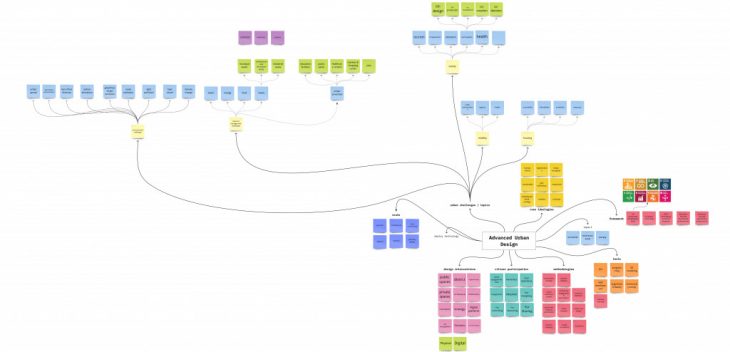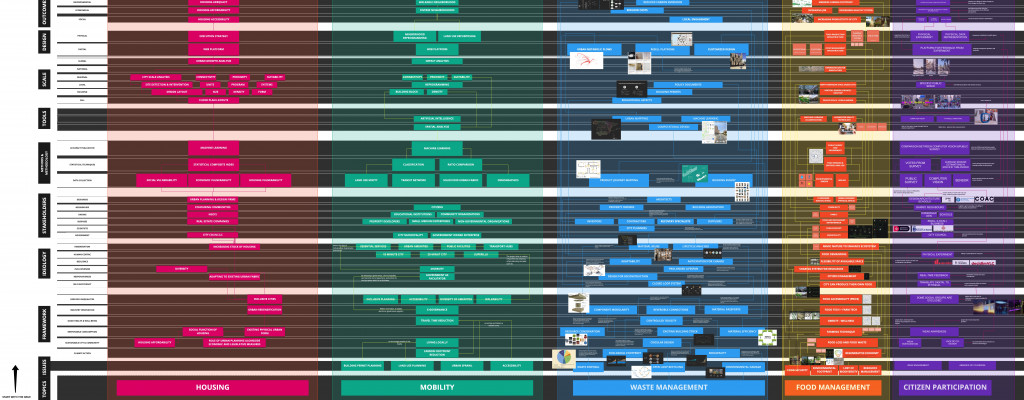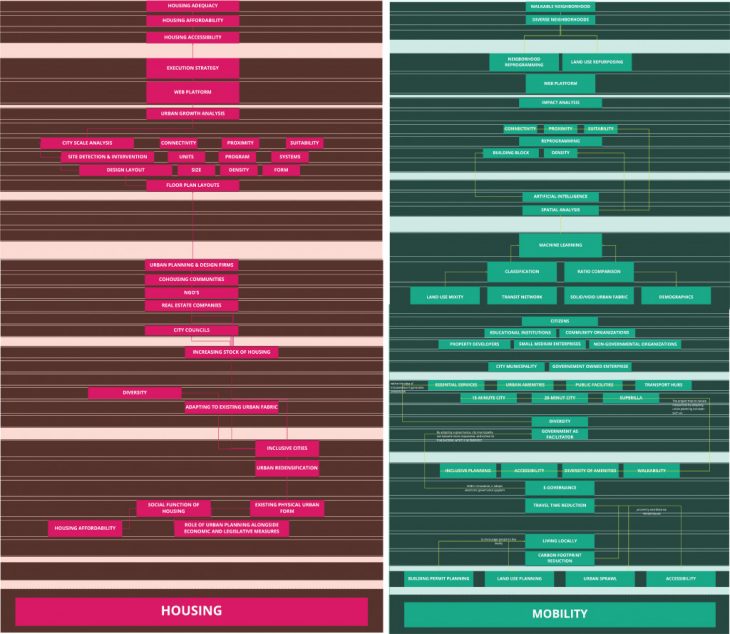Overall
The research of Advanced Urban Design starts with the experiment of ingredients that need to be concerned.

Then the research has been organized following the issue and the core idea of the research starts from the left side. From bottom to the top following the color code. The connection and flow of the the relationship are connected with the line. 
Pink: Housing / Green: Mobility / Blue: Waste Management / Orange: Food Management / Purple: Citizen Participation
Initial Research and Issues of interests
Topic of projects lead to find the connection of relationship in each topic by defining the frameworks such as housing and mobility. Mobility project purpose to design urban amenities which will response to housing. While waste management for construction material are designed to recycle the material for the new construction that probably can be the answer of affordable housing. Waste management project can be similar to food management for the sustainable city and responsible consumption. However, food management is also concern for good health and well-being that relate to citizen participation. If the city can be develop the system of public decision, it can bring the innovation and reduced inequalities.
It seems all topic are related and has thing in common such as the role of urban planning alongside economic and legislative measures, developing the project according to existing physical urban form, inclusive cities, digital and physical infrastructure, local aspects, carbon footprint reduction, modularity, circular design, and co-design approaches.

Framework and Ideology
After understanding common thing to be concerned in advanced urban design, what the factor can shape the city in the future. The next step of the research is setting the milestone to develop project in each perspective following the framework in term of environmental, social and economic perspective.
For environment, the climate action is the most important issue to be concerned in waste management for circular economy and food management for regenerative economy. Mobility also concern in term of carbon footprint reduction. On the other hand, responsible consumption also take the role by housing project such as using exiting function of housing and physical urban form. For waste management, the big impact is resource conservation. How to demolish the building and the material can be recycled. However, for food management, to generate food in the city is uncommon thing. So it need the innovation of food and farm technology to optimize the resource management.
For social and economic, regenerative is the most concern in every issues such as for housing is increasing stock of housing. Mobility project also generate the new function in the city such as the urban amenities and transport hubs. Waste management is more focus on lifecycle and food management is more focus on urban ecological to mimic natural system for pollination. While citizen participation is the most concern in human-centric.

Stakeholders
The next question of the research is who are going to do and the responsibility. Understanding stakeholders is also important in urbanism. Even the most common idea is government but in the reality, there are many parties to be involved.
Government is the key player and all of projects, city council take the big role to make a move.
Scientists and specialists require in waste and food management when the research need specific topic to make the system works such as recovery specialists for waste management. Food scientists and biologists are necessary for developing the food production system in the city
Businesses are different industry in each project such as housing, mobility and waste management will deal with real estate developer and construction companies. While food management and citizen participation will work with small business such as food and restaurant entrepreneur.
Integration of Advanced Urban Design
Method, methodology and tool : all projects use similar methodology and tool for data collection, statistical techniques, accuracy evaluation.
Data collection, housing and mobility project work with the dataset that provide by city council while waste, food management and citizen participation need to generate the new data by using technology of IoT such as sensor.
statistical techniques, there are various methods depending on the criteria and ability to measure such as housing project will use the index. Mobility will use classification and comparison. Food management and citizen participation will use the amount of data for statistical such as sentinel analysis and public survey.
accuracy evaluation, machine learning are commonly used in the urbanism for housing, mobility and food management but citizen participation will compare between computer vision and public survey for the evaluation

Expect Outcome
Following scale, design interventions and impacts, the research represents various outcome for shaping the future of the city.
Cell : housing and food management project are the most impact on spatial management to make it adequacy, affordability, and accessibility. Consequently, design intervention will be execution strategy and digital platform for housing stock management.
Building : mobility, waste and food management will be response for climate action to minimize carbon footprint. For example, mobility project will reprogram of the building to provide urban amenity as a result to reduce the traveling, so the design intervention will be digital platform for neighborhood reprograming and land use repurposing then carbon footprint is reduced that similar to food management as space in building can be used for food production as a result to reduce the import of food as a result to design intervention both physical and digital. Especially, developing food production infrastructure. While waste management will focus on digital design intervention such as customized design and resell platform
Local : all project will concern about law and regulation that can control the action and impact. It should be developed for every parties to have the mutual benefits.
Regional : City scale and interconnection between the city are concerned especially the project that resource management are involved such as housing, waste and food management
National : citizen participation project will take the big consideration for public decision, especially the gigantic project such as infrastructure that result to design intervention for digital platform and physical interaction in public space
Global : urban growth analysis is the key to understanding and prediction of human settlement then the all facility will be developed following the growth.
Individual Cosmogramme
Housing and Mobility
Waste Management, Food Management and Citizen Participation

ADVANCED URBAN DESIGN is a project of IAAC, Institute for Advanced Architecture of Catalonia developed in the Master in City and Technology 2019/21 by:
Students: Pawitra Bureerak, Aryo Dhaneswara, Linara Salikhova, Kushal Suraiya, Deepika Raghu
Faculty: Mireia Luzarraga
